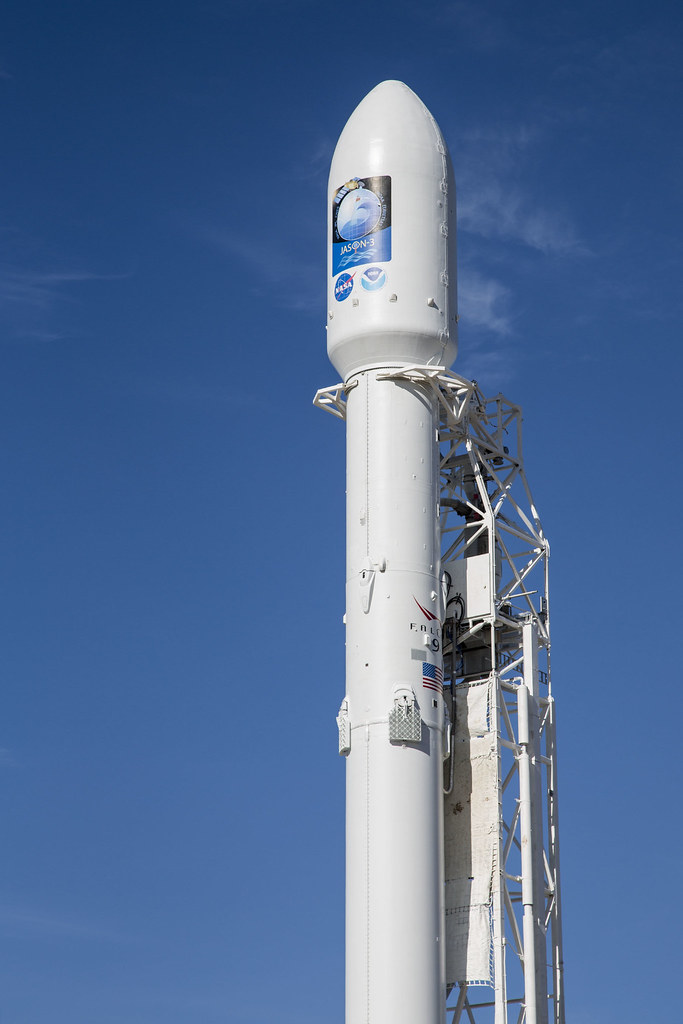SpaceX Falcon 9 makes nearly perfect landing
SpaceX launched one of its Falcon 9 rockets on Sunday, January 17 at 10:42 am from Vandenberg Air Base in California.
The rocket’s primary mission was to send the NASA satellite Jason-3 into orbit. A “secondary test objective” (according to the SpaceX press package) was to land the first stage of the rocket back on a barge in the Pacific Ocean, completely intact.
Approximately an hour after takeoff, the Falcon 9 successfully released the satellite into a polar orbit, 830 miles above the Earth. The purpose of Jason-3 is to monitor global sea-levels and temperatures. The highly precise instruments in the satellite can also be used to forecast weather events and research marine ecosystems.

Sunday’s launch was SpaceX’s third failed attempt to land a booster on a drone ship according to HuffPost Hawaii. The first stage of the rocket successfully touched down on the SpaceX autonomous drone ship “Just Read the Instructions”. However, one of the landing legs did not lock in place and the booster toppled over.
Elon Musk, the CEO of SpaceX (as well as Tesla Motors), posted a video on Instagram of the Falcon 9’s attempted landing. Referring to the landing leg failure, Musk wrote, “[The] root cause may have been ice buildup due to condensation from heavy fog at liftoff.”
A Falcon 9 booster did land successfully (on the ground) last month on December 21 at Cape Canaveral Air Force Base in Florida. The rocket carried a payload of 11 ORBCOMM communication satellites to low earth orbit.
SpaceX rockets cost between $60 and $90 million, not including fuel costs. Landing a booster safely and reusing it could allow the cost of space travel to be “reduced by as much as a factor of a hundred,” said Musk. Despite their recent setbacks, SpaceX’s “ultimate goal of enabling people to live on other planets” (according to the company’s website) may not be so far off after all.






Micah Summers • Jun 6, 2016 at 9:51 pm
Despite saying that the craft almost made a perfect landing, the subsequent launching of this all mighty metal container of non-animate expresses greatly the creativity and genius behind Elon Musk. Therefore, such small things as a “almost perfect landing” deserves little thought and should be re titled a stupendous success.
Crystal R. Sung • Jun 7, 2016 at 5:56 pm
First off, “mighty metal container of non-animate” makes no sense whatsoever.
Second, it’s technically impossible to make a perfect landing.
Finally, alliteration is annoying.
Micah Summers • Jun 9, 2016 at 1:35 pm
Recently, the light has shone upon the appearance of a person named Crystal. As foretold by Elon Musk there is a one in a billion chance we are living in base reality. Therefore we are a metal container of inanimate souls flying fairly through the astronomicly astounding aperture of adaptations in ‘Murica
Crystal R. Sung • Jun 16, 2016 at 6:38 pm
I think I must make it Crystal clear that however brilliant it may seem to string lapidary vocabulary together, they may not always form coherent thoughts. This is elucidated in the alliterated example of “astronomicly astounding aperture of adaptations in ‘Murica”. Firstly, “astronomicly” is spelled wrong. Next, “aperture of adaptations” makes little sense. Finally, “‘Murica” is a vulgar colloquialism that is irrelevant to the context of your comment.
Bob • May 3, 2016 at 11:39 am
this was amazing to watch!